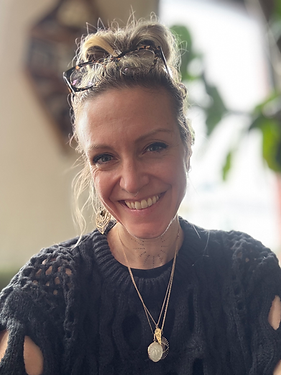
Catherine Chinnock, LCPC, LMHC
Psychotherapist, Art Therapist, Ketamine Assisted Psychotherapist
About
As a therapist in practice for over twenty years, I have worked with all ages of people with diverse experiences of the world. I've helped people in developing their ability to manage daily life, strengthen relationships, connect with their own inner darkness, move through deep experiences of pain, and exist in a world that feels lonely and isolating. I've shared the joys of connecting with inner strength, building resources previously unimagined, finding voice, discovering innate creativity, and connecting with something greater. In all of these relationships, my focus was to support people in unapologetically being themselves, in listening to their inner wisdom, or in sharing their unique gifts, talents, and perspective.
I find my style resonates with people who feel a little bit different, maybe it's not obvious, but there is something that leaves you feeling a little on the outskirts. Maybe you've struggled to find deeper conversation or crave social connections that go beyond "grabbing drinks and catching up." Maybe you've done "the thing" but there's still something that leaves you feeling unfulfilled. Maybe you feel called to exploration and conversation about consciousness, the universe, and how to make sense of it all.
I’m here to support you in deepening your relationship with yourself and finding the space where you to feel connected and fulfilled. I believe that as we allow ourselves to experience deep love, joy, respect, and connection with ourselves and with others, we move into a more expansive state of consciousness: healing ourselves and contributing to the healing of all beings.

Credentials:
MA in Art Therapy, University of Illinois at Chicago
Licensed Clinical Professional Counselor, Illinois #180.005375
Licensed Mental Health Counselor, New York #9544-01
Certified Clinical Trauma Professional
Sensorimotor Psychotherapy Level I; Assistant for Level I
Holographic Memory Resolution (HMR) Level I and II
Reiki Level I and II
Podcasts and Publications
Co-hosted with Steve Ploum exploring creativity, balance, and the tension that exists as we find our creative selves.
"Feelings Are Complicated Fuckers"
Self-published through Amazon
Approach
Therapy can be many different things. I work in three ways that can intertwine and build upon one another or stand alone as a framework for therapy. True through all of these approaches are my values in connection, integrity, transparency, curiosity, presence, and creativity.
Deep Internally Focused Therapy
The depth work of my practice centers the exploration of identity, purpose, and meaning. Exploring the intertwining nature of these things and the evolution of them throughout the lifespan. Bordering on the spiritual and the philosophical, my approach to therapy is experiential, relational, and exploratory. It is nonprescriptive, depathologizing, and nonlinear. It is an art of balance in exploring the vast experiences of humanity and the unknown of the spiritual. Our focus is to develop your capacity to listen to your heart, body and spirit, expanding your capacity for self-trust and self-healing.


Psychotherapy
I recognize that for many people seeking therapy is about finding a sense of stability and the thought of going inward or deep invites instability. If you are someone seeking support in coping with the demands of being a human, managing the emotional overwhelm of depression or anxiety, or navigating the dynamics of family and relationship, therapy may take a more practical, supportive, relational approach. It’s a place to be heard, challenged, and supported. Together we can lay it all out and see what we see together.

Ketamine Assisted Psychotherapy
Ketamine Assisted Psychotherapy (KAP) is a movement into the experiential that has the potential for healing through surrendering to the unknown, inviting courage and curiosity, shifting trust and vulnerability in the therapeutic relationship, opening neural pathways to invite reflection on old patterns, connection with the spiritual, and facing fear. Working with ketamine through Ketamine Assisted Psychotherapy is not a guaranteed “magic cure;” it is a space for you to open to change and possibility in whatever form it comes.